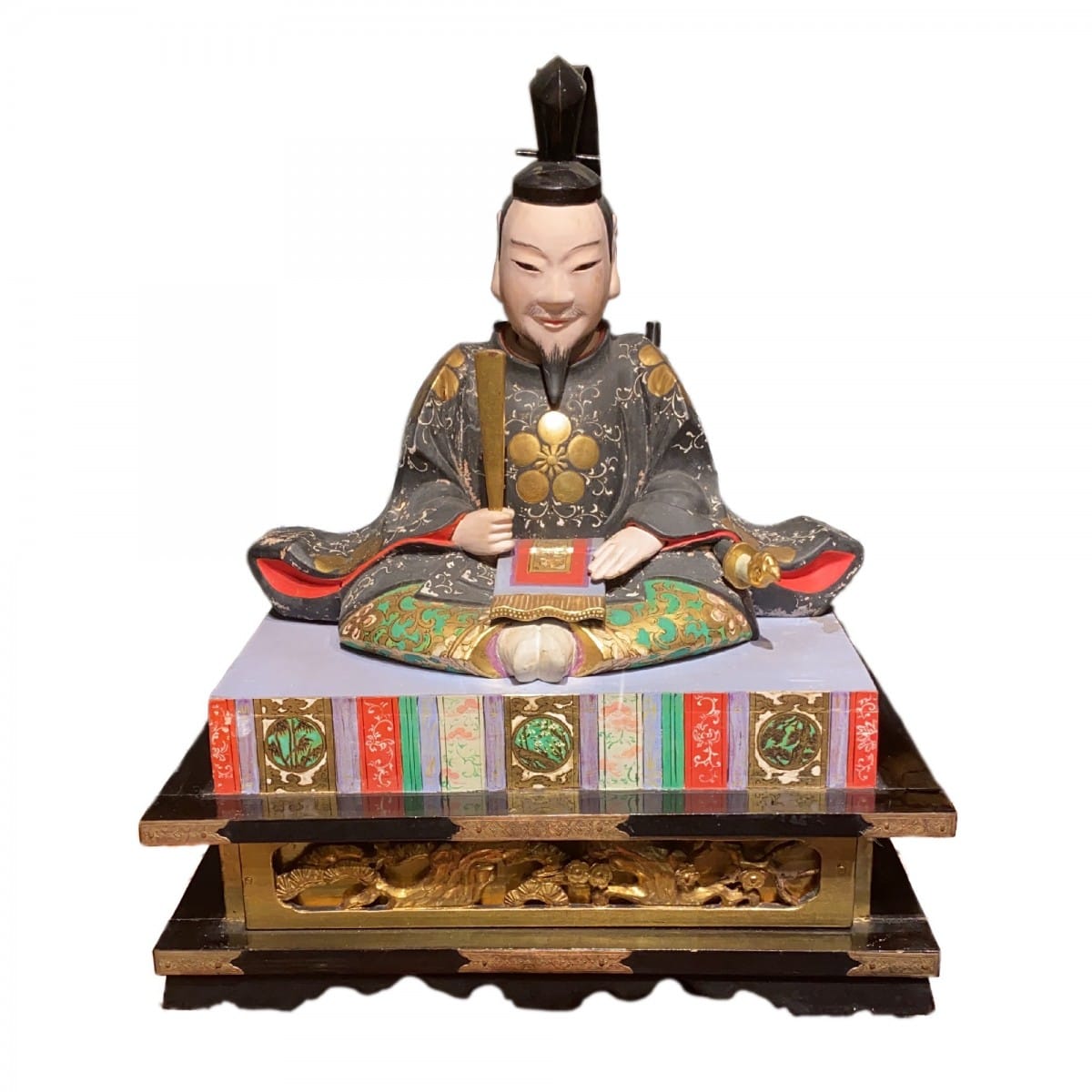Sugawara no Michizane, a prominent scholar, poet, and politician of the Heian period (794-1185 AD) in Japan, rose to high ranks within the imperial court, only to be unjustly exiled and later deified as Tenjin, the revered god of learning. His life, marked by both scholarly achievement and political intrigue, continues to resonate in Japanese culture today, from ancient shrines to contemporary anime.
The Rise and Fall of a Scholar-Politician
Born on August 1, 845 AD, into a family of scholars bearing the hereditary title of Ason, Michizane demonstrated exceptional academic talent from a young age. His grandfather, Sugawara no Kiyotomo, served the Imperial Court, laying the groundwork for Michizane’s future career. He excelled in both waka (Japanese poetry) and kanshi (Chinese poetry), quickly gaining recognition as a literary giant of his time. His extant works, including the esteemed Kanke Bunshu (a collection of Chinese poetry) and the influential “Kana Preface,” offer valuable insights into the intellectual and cultural landscape of Heian-period Japan.
Michizane’s scholarly prowess propelled him through the ranks of the imperial court. He navigated the complexities of court politics with apparent skill, reaching positions of significant influence. However, his success may have inadvertently fueled rivalries, particularly with the powerful Fujiwara clan. This rivalry, likely rooted in political ambition and perhaps a degree of envy, would ultimately prove to be his undoing. In 901 AD, Michizane was falsely accused of conspiring against the emperor, a charge almost certainly fabricated by the Fujiwara clan to eliminate a potential threat. As a result, he was exiled to Dazaifu, a remote location in Kyushu. This exile, a devastating blow to his reputation and career, ultimately led to his death in 903 AD.
From Exile to Divinity: The Birth of Tenjin
Following Michizane’s death, a series of unfortunate events, including natural disasters and political turmoil, struck the capital. These calamities were attributed by many to the vengeful spirit (onryō) of the unjustly exiled scholar. Whether these events were truly supernatural in origin or merely coincidental remains a subject of debate among historians. Some suggest that political factions may have exploited these events to advance their own agendas, attributing them to Michizane’s vengeful spirit as a means of gaining power or influence. Regardless of the precise circumstances, the fear generated by these events prompted the imperial court to take decisive action.
In an attempt to appease Michizane’s restless spirit, the court posthumously pardoned him, restoring his former rank and ultimately deifying him as Tenjin, the god of learning. This deification likely served multiple purposes: it aimed to pacify the supposedly vengeful spirit, it offered a form of restitution for the injustice he suffered, and it potentially served as a political maneuver to stabilize the court and quell public unrest. The story of his exile, deification, and continued reverence offers a compelling example of how history, folklore, and even resentment can shape cultural beliefs. This act marked a dramatic shift in Michizane’s legacy, transforming him from a disgraced political figure into a revered deity.
The Enduring Legacy: Shrines, Amulets, and Anime
Over the centuries, Tenjin’s popularity grew, and numerous shrines (Tenmangu shrines), dedicated to his worship, were erected throughout Japan. Perhaps the most famous of these is the Dazaifu Tenmangu Shrine, located at the very site of his exile. This shrine, once a place of banishment, became a place of pilgrimage for students and scholars seeking Tenjin’s blessing for academic success, a remarkable transformation mirroring Michizane’s own journey from disgrace to divinity. Even today, students often carry omamori, special amulets featuring Tenjin’s image, for good luck on exams. This practice underscores the enduring power of his story and its continued relevance in contemporary Japanese culture.
Septimia Zenobia, Queen of Palmyra, much like Michizane, experienced a dramatic shift in fortune, transitioning from a powerful ruler to a figure subjected to Roman authority. Their stories, though separated by centuries and cultures, offer intriguing parallels in the face of political adversity. While Michizane’s legacy is tied to scholarship, other figures, like Tilly Losch, achieved renown in artistic fields, highlighting the diverse ways in which individuals leave their mark on history.
The story of Sugawara no Michizane transcends the boundaries of historical narrative, permeating various forms of Japanese media, including literature, theater, and even contemporary anime, such as Jujutsu Kaisen. In this popular anime series, Michizane figures prominently as one of the three most powerful vengeful spirits and as a distant ancestor of key characters, Satoru Gojo and Yuta Okkotsu, underscoring his enduring presence in Japanese popular culture. His image continues to resonate, not just as a historical figure but as a symbol of perseverance, intellectual achievement, and the complex relationship between humans and the supernatural. This blending of historical fact and fictional narrative contributes to the richness and complexity of Michizane’s legacy.
Ongoing Research and Unanswered Questions
While much is known about Sugawara no Michizane and his transformation into Tenjin, there remain areas of active research. Historians continue to examine the intricacies of Heian period court politics, seeking a more nuanced understanding of the events that led to his exile. The specific motivations of the Fujiwara clan, the nature of the accusations against Michizane, and the precise circumstances surrounding his death are all subjects of ongoing scholarly inquiry. The evolution of his worship as Tenjin, from its initial inception to its current form, is also an area of continuing study. How has his image been interpreted and reinterpreted over time, and what factors have contributed to these changes? Further research into the Heian period and the beliefs surrounding Tenjin may yet uncover more layers to this compelling story.
The dichotomy between Michizane’s life as a scholar and his posthumous reputation as a potentially vengeful spirit presents a fascinating area of exploration. How did this duality emerge, and what does it suggest about the cultural understanding of justice, retribution, and the power of the human spirit? Analyzing his poems written during his exile may offer further insights into his emotional state and shed light on the origins of the legends surrounding his vengeful spirit.
By acknowledging the complexities and uncertainties inherent in historical interpretation, we can appreciate the multifaceted nature of Sugawara no Michizane’s legacy. He remains a figure of enduring fascination, prompting us to explore the intersections of history, literature, religion, and popular culture. His story serves as a testament to the power of words, the enduring impact of political intrigue, and the human capacity to find meaning in the face of injustice.
- Unlocking Francis Alexander Shields’ Finance Empire: A Comprehensive Biography - July 12, 2025
- Unveiling Francis Alexander Shields: A Business Legacy - July 12, 2025
- Francis Alexander Shields’ Business Career: A Comprehensive Overview - July 12, 2025















